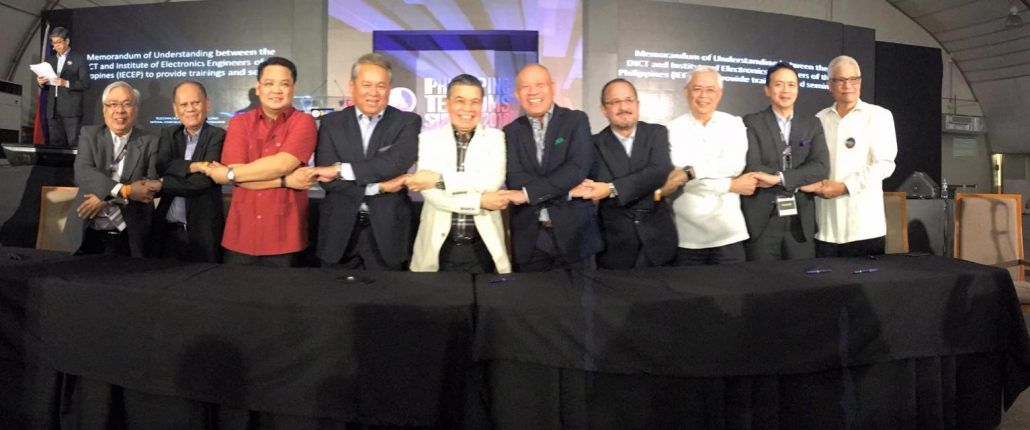
In the 2 day forum of the DICT named as #PHTelecomsSummit, the government agency gathered all of the concerned telecom partners, stakeholders, national government bodies, local government representatives and the media to discuss the progress of ICT of the country.
The summit concluded with a MOA (Memorandum of Agreement) between the Department of Information Communications Technology, National Telecommunications Commission, Department of the Interior and Local Government, PLDT, Smart, Globe and Philippine Chamber of Telecommunication Operators to pledge cooperation in removing industry barriers and deliver faster internet for all.

But what happened in the two-day summit? We watched over the live stream and we will share to you our observation.
According to the latest data from TowerXchange, the Philippines has an estimated number of 16,300 cell sites for a population of 103 million. Each cell site is serving a lot of customers which makes them congested, as compared to neighboring countries like Vietnam with 70,000 cell site towers. Globe and Smart voiced out that permitting is the issue of the slow internet as they can’t deploy cell sites fast enough to meet demand.
The 1st day of the summit was concluded through one clear message of removing red tape in LGU permitting to create new cell sites. Until now with the new administration, stubborn local government units takes up 8 months to finish processing more than 25 permits for one cell site.
DICT Secretary Salalima highlighted that permitting necessary for telecommunications should only take up Seven days. But in an event that no decision has been made after, the permit should be deemed approved automatically. If a local government denies a permit, it should be able to give justification appropriate according to the law.
The DILG was also present in the event highlighting that a standard rate table should be proposed to avoid under the table cost and reduce red tape. Other representatives also challenged Globe and Smart to disclose the stubborn local government units to let the DILG do some legal action.
Secretary Salalima is confident that if this recommendation of his is followed, the Philippines will be looking at improvements on the telecoms services just after six months.
This sensitive topic is the reason why more than 3,000 cell sites of Globe are put to hold especially in posh villages with fear of residents getting cancer. A homeowners association should agree first on a cell site will be built in their area before granting a permit.
But it was clarified in the summit through a DOH representative that cell sites emit very low radiation which isn’t scientifically proven to cause cancer. Additionally, Secretary Salalima also stated that even the DOJ had ruled out this issue and declared that cell sites are deemed safe.
In figure, the radiation of cell sites is only thermal based which is 50x lower than the safety standard issued. This means that cell sites are even safer rather than using x-ray machines and alike.
The works of a new broadband network case study are underway, you can actually check out the draft at the DICT website. The DICT plans to submit the final plan by mid 2017 to the president and have it underway by 2018. Ultimately the national broadband network will enable the government to have a unified network, sole portal for all government agencies and assure the future of ICT in the country.
This question was answered by Secretary Salalima that there is a need for a 3rd telco and bring more competition for public benefit. But several points were stated with the barriers of a 3rd player entering the Philippines.
The controversial tax reform was also discussed by Congressman Joey Sarte Salceda in the forum, he explained all laws and house bills that affect the telecoms industry. Also including the upcoming tax reforms and why it should happen.
He presented that only 10% of the population can only afford a vehicle where 90% are left with their dreams of owning a car due to outdated taxes. Ultimately, lower earning citizes will have fewer taxes which will be carried over to the higher class, gas, oil, electric and other industries to compensate.
The highlight of his presentation is that our tax reform law wasn’t changed until 1950’s, this outdated our law and deemed us uncompetitive as compared to our neighboring countries.
The 1st PH Telecoms Summit was an eye opener, it revealed a lot of perspectives for the telecom players, government, media and public to discuss. The forum’s aim is to bring a solution to the ever growing need of faster and more stable internet connection.
If there is one lesson we should get from this summit, it is that the DICT is not an expense generating agency as it is an investment for the country to propell itself and be more competitive against other countries.
We hope that in the next 6 months, we will be able to see the fruits of this summit and we can see drastic changes in the government when it comes to treating ITC.
